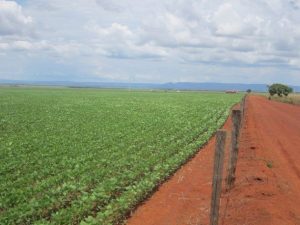Brazil: Inequality Sharpened, Social Policies Dismantled, More Millions Pushed into Hunger
 13 Juni 2022
13 Juni 2022

Brazil ranks as the third largest economy in the Americas, and the 10th largest in the world, It is a major exporter of food products, but, hunger has surged over 70% in just two years in the country, impacting more than 33 million people, up from 19 million in 2020. Credit: Mario Osava/IPS
By IPS Correspondents
RIO DE JANEIRO, Jun 13 2022 (IPS)
Right now, out of a total of 211.7 million Brazilians, 116.7 million are experiencing some level of food insecurity, 43.4 million do not have enough food, and 19 million were facing hunger, reveals a June 2022 report by the Brazilian Research Network of Food and Nutrition Sovereignty and Security (Rede PENSSAN).
The results of its national survey show that less than half of Brazilian households (44.8%) were food secure, while 55.2% of households were experiencing some level of food insecurity, and 9% of households were facing hunger (severe food insecurity).
In Brazil, someone earning the minimum monthly wage would have to work 19 years to make the same money a Brazilian from the richest 0.1% of the population makes in one month
The situation is even worse in rural areas, where 12% of households are affected by hunger, reveals the survey, while explaining that in rural areas, severe food insecurity is twice as high in households without access to water for food and livestock production compared to those with access to water.
Historic setback
According to the Rede PENSSAN, the current situation in this Latin American largest economy reflects a “historic setback” for a country that had made huge gains against poverty.
Such gains were successively achieved by the Government of former Brazilian president Luiz Inácio Lula da Silva, who ruled the Latin American giant from January 2003 to the end of 2010.
Lula’s successor, Dilma Rousseff, continued with the same social policies, from January 2011 to May 2016. Roussef was succeeded by Michel Miguel Elias Temer Lulia from 31 August 2016 to 31 December 2018.
Social policies, dismantled
Thanks to both Lula da Silva and Dilma Roussef social policies, Brazil lifted 28 million people out of poverty in just 15 years, reducing poverty to less than 10% of the population.
Then came current president Jair Messias Bolsonaro, an ex-military who took office on 1 January 2019, whose regime has been dismantling the considerable hunger reduction and social gains which were achieved by his predecessors’ governments.
Among other dire consequences, households with income of up to half of a minimum monthly salary per capita face severe food insecurity at levels 2.5 times the national average.
The study also pointed to persistent inequalities among regions, including disparities in household income, which are important determinants of food access.
Extreme inequality
In addition to the increasing sharp inequalities between Brazilian regions and between urban and rural populations, economic inequality in Brazil has reached extreme levels, despite being one of the largest economies in the world, reports OXFAM International.
The last decades have seen incredible progress across Brazil. The country has been able to reduce inequality, taking millions of people out of poverty and thereby raising the base of the social pyramid, OXFAM reminds.
But despite this evolution, the pace has been very slow and the Latin American giant is still listed as one of the most unequal countries on the planet, adds OXFAM in its report Extreme Inequality in Brazil in Numbers.
The numbers
The report provides some staggering numbers:
-
In Brazil, someone earning the minimum monthly wage would have to work 19 years to make the same money a Brazilian from the richest 0.1% of the population makes in one month.
-
At the current rate inequality is decreasing in Brazil, it will take the country 75 years to reach the United Kingdom’s current level of income equality and almost 60 years to meet Spanish standards.
-
Compared to its neighbours, Brazil is 35 years behind Uruguay and 30 behind Argentina.
Richest 5%, same income as poorest 50%
But while such sharp inequality is hitting the most vulnerable in Brazil, it strikes even harder Brazilian women and blacks. See these OXFAM numbers:
-
Brazil’s six richest men have the same wealth as the poorest 50% of the population; around 100 million people. The country’s richest 5% have the same income as the remaining 95%.
-
If Brazil’s six richest men pooled their wealth and spent 1 million Brazilian reals a day (around $319,000), it would take them 36 years to spend all their money. Meanwhile, 16 million Brazilians live below the poverty line.
-
At the current pace of progress, Brazilian women will close the wage gap in 2047. Black Brazilians will earn the same as whites in 2089. Brazil is decades away from wage equality.
Big food producer and exporter
Such is the current harsh reality of a giant country covering more than 8,5 square kilometres of land, home to over 214 million people, which ranks as the third largest economy in the Americas, and the 10th largest in the world by nominal gross domestic product (GDP).
Brazil is rich in resources, being the world’s largest producer of coffee over the last 150 years. It is also a major exporter of food products, such as soy, maize, beef, chicken meat, soybean meal, sugar, tobacco, cotton, orange, among others.
Amidst sharpening inequality and the ongoing dismantling of social policies, hunger in Brazil surged over 70% in just two years, impacting more than 33 million people, up from 19 million in 2020.
